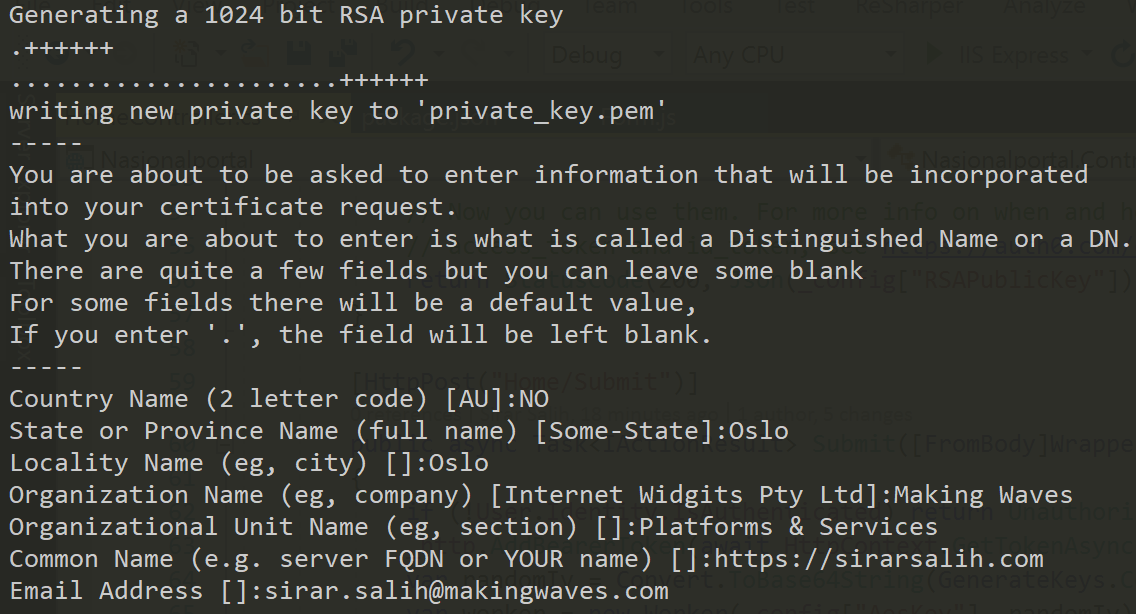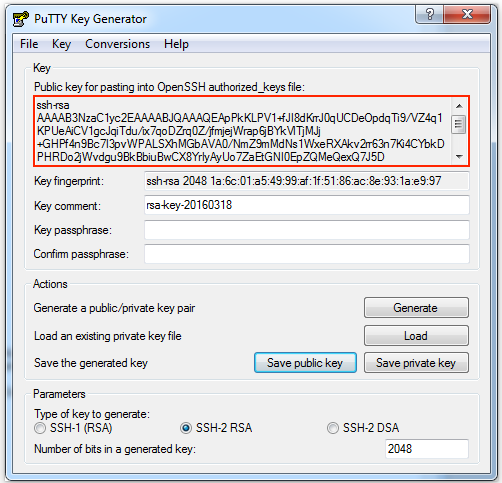Generate 1024-bit Rsa Public Private Key Pair Openssl
The RSA Algorithm. The Rivest-Shamir-Adleman (RSA) algorithm is one of the most popular and secure public-key encryption methods. The algorithm capitalizes on the fact that there is no efficient way to factor very large (100-200 digit) numbers. RSA encryption usually is only used for messages that fit into one block. Openssl rsa -in rsa.private -out rsa.public -pubout -outform PEM 2. The public key is saved in a file named rsa.public located in the same folder. Generating the Private Key - Linux 1. Open the Terminal. Navigate to the folder with the ListManager directory. Type the following: openssl genrsa -out rsa.private 1024 4.
- Generate 1024-bit Rsa Public Private Key Pair Openssl Download
- Generate 1024-bit Rsa Public Private Key Pair Openssl Windows 10
- Public Private Key Encryption
- Generate 1024-bit Rsa Public Private Key Pair Openssl Version
You may generate an RSA private key with the help of this tool. Additionally, it will display the public key of a generated or pasted private key.
Description
RSA is an asymmetric encryption algorithm. With a given key pair, data that is encrypted with one key can only be decrypted by the other. This is useful for encrypting data between a large number of parties; only one key pair per person need exist. RSA is widely used across the internet with HTTPS.
To generate a key pair, select the bit length of your key pair and click Generate key pair. Depending on length, your browser may take a long time to generate the key pair. A 1024-bit key will usually be ready instantly, while a 4096-bit key may take up to several minutes. For a faster and more secure method, see Do It Yourself below.
CryptoTools.net does not yet have a tool for facilitating the encryption and decryption of data using RSA, but you may Do It Yourself with the instructions below.
Do It Yourself
For these steps, you will need a command line shell with OpenSSL. Ideally, you should have a private key of your own and a public key from someone else. For demonstration, we will only use a single key pair.
Generate Private Key
Run this command to generate a 4096-bit private key and output it to the private.pem file. If you like, you may change the key length and/or output file.
Derive Public Key
Given a private key, you may derive its public key and output it to public.pem using this command. (You may also paste your OpenSSL-generated private key into the form above to get its public key.)
Encrypt Data
We can now use this key pair to encrypt and decrypt a file, data.txt.
Decrypt Data
Given the encrypted file from the previous step, you may decrypt it like so.
genpkey - generate a private key
opensslgenpkey[-out filename][-outform PEM DER][-pass arg][-cipher][-engine id][-paramfile file][-algorithm alg][-pkeyopt opt:value][-genparam][-text]
The genpkey command generates a private key.
the output filename. If this argument is not specified then standard output isused.

This specifies the output format DER or PEM.
the output file password source. For more information about the format of argsee the PASS PHRASE ARGUMENTS section in openssl.
This option encrypts the private key with the supplied cipher. Any algorithmname accepted by EVP_get_cipherbyname() is acceptable such as des3.
specifying an engine (by its unique id string) will cause genpkeyto attempt to obtain a functional reference to the specified engine,thus initialising it if needed. The engine will then be set as the defaultfor all available algorithms. If used this option should precede all otheroptions.
public key algorithm to use such as RSA, DSA or DH. If used this option mustprecede any -pkeyopt options. The options -paramfile and -algorithmare mutually exclusive.
set the public key algorithm option opt to value. The precise set ofoptions supported depends on the public key algorithm used and itsimplementation. See KEY GENERATION OPTIONS below for more details.
generate a set of parameters instead of a private key. If used this option mustprecede and -algorithm, -paramfile or -pkeyopt options.
Some public key algorithms generate a private key based on a set of parameters.They can be supplied using this option. If this option is used the public keyalgorithm used is determined by the parameters. If used this option mustprecede and -pkeyopt options. The options -paramfile and -algorithmare mutually exclusive.
Print an (unencrypted) text representation of private and public keys andparameters along with the PEM or DER structure.
The options supported by each algorith and indeed each implementation of analgorithm can vary. The options for the OpenSSL implementations are detailedbelow.
The number of bits in the generated key. If not specified 1024 is used.
The RSA public exponent value. This can be a large decimal orhexadecimal value if preceded by 0x. Default value is 65537.
The number of bits in the generated parameters. If not specified 1024 is used.
Generate 1024-bit Rsa Public Private Key Pair Openssl Download
The number of bits in the prime parameter p.
The value to use for the generator g.
If this option is set then the appropriate RFC5114 parameters are usedinstead of generating new parameters. The value num can take thevalues 1, 2 or 3 corresponding to RFC5114 DH parameters consisting of1024 bit group with 160 bit subgroup, 2048 bit group with 224 bit subgroupand 2048 bit group with 256 bit subgroup as mentioned in RFC5114 sections2.1, 2.2 and 2.3 respectively.
the EC curve to use.
Gost 2001 support is not enabled by default. To enable this algorithm,one should load the ccgost engine in the OpenSSL configuration file.See README.gost file in the engines/ccgost directiry of the sourcedistribution for more details.
Use of a parameter file for the GOST R 34.10 algorithm is optional.Parameters can be specified during key generation directly as well asduring generation of parameter file.
Specifies GOST R 34.10-2001 parameter set according to RFC 4357.Parameter set can be specified using abbreviated name, object short name ornumeric OID. Following parameter sets are supported:
The use of the genpkey program is encouraged over the algorithm specificutilities because additional algorithm options and ENGINE provided algorithmscan be used.
Adobe acrobat dc key code. Generate an RSA private key using default parameters:
Encrypt output private key using 128 bit AES and the passphrase 'hello':
Generate a 2048 bit RSA key using 3 as the public exponent:

Generate 1024 bit DSA parameters:
Generate 1024-bit Rsa Public Private Key Pair Openssl Windows 10
Generate DSA key from parameters:
Generate 1024 bit DH parameters:
Public Private Key Encryption
Output RFC5114 2048 bit DH parameters with 224 bit subgroup:
Generate 1024-bit Rsa Public Private Key Pair Openssl Version
Generate DH key from parameters:
